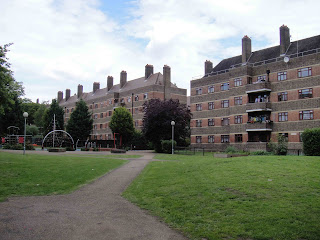The combination of inter-war modernism and English vernacular shouldn't work but somehow does.
I think this two tone brickwork is ace and the replacement windows could be a lot worse (ie white PVC) . If they were untreated oak that would be the ultimate.
Could do with a lick of paint here and there.
The planting is not in the Lillington Gardens league but does it's job well enough, decent (newish) playground, low level improvements by council quite sucessful...
So all in all very good, excellent, well done.
...and while it's probably another fairly good example of inter-war council housing the experience was instantly more anxiety creating - and I'd put this down to its size (and a nervous disposition). It's a lot bigger than Poynders Gardens, starker, bleaker, more windswept...
One more foray into council housing for today...

Although the estate is now characterised by a rather unappealing artificial slate cladding....
...a few of the external stairs hint at there being something more interesting underneath...
That's black painted perforated metal screening. V'nice.
Here's the backside.
phowarrrr!!!














AFAIK Blenheim Gardens has been slate clad since it was built. And I remember it before the encrustation of satellite dishes.
ReplyDeleteVictor Meldrew voice...'I DON'T BELIEVE IT!!'
ReplyDeleteInteresting posts. Blenheim has always has slate.
DeleteThis comment has been removed by the author.
ReplyDeleteI left Brixton Hill in the early 1980s (though the SW2 sorting office was by Blenheim Gardens, so I came back from Streatham Hill when I needed to collect a parcel!) and I can't imagine it without the slate cladding.
ReplyDeleteLooks like the balance is swinging toward slate being the original cladding...Still looks an odd choice to me but maybe there was a kind of 'vernacularization' thing going on although the 1970s were not generally aflicted by that kind of impulse.
ReplyDelete